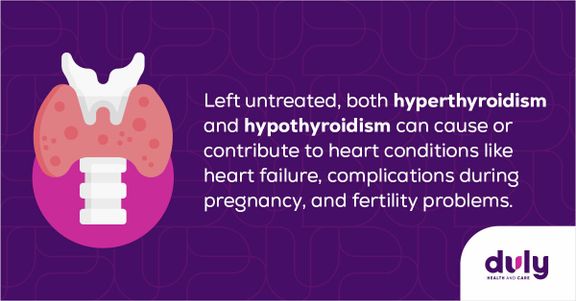You’ve heard of having butterflies in your stomach. But what about the butterfly in your neck?
That would be the thyroid. The thyroid is a small, butterfly-shaped gland located beneath the skin. It is responsible for producing the thyroid hormone, which is primarily responsible for controlling the rate of your metabolism (how your body converts food into energy).
Your body relies on thyroid hormones to regulate how fast (or slow) your body uses the energy it needs — which means that thyroid disease can affect your entire body in some pretty significant ways.
A Tale of Two Thyroid Diseases: How Hyperthyroidism and Hypothyroidism Affect Your Body
Two of the most common types of thyroid disease are hyperthyroidism and hypothyroidism.
Hyperthyroidism, or “overactive thyroid,” occurs when the thyroid makes more thyroid hormone than your body needs to function. On the opposite end of the spectrum, hypothyroidism — also called “underactive thyroid” — is when your thyroid doesn’t make enough.
Symptoms vary, but some of the most common include:
Symptoms of Hyperthyroidism
- Fatigue
- Weight loss, but increased appetite
- Trouble tolerating heat
- Frequent bowel movements
- Rapid heartbeat
- Muscle weakness
- Difficulty sleeping
- Mood swings
- Goiter (enlarged thyroid that makes your neck appear swollen and may cause problems with swallowing or breathing)
- Bulging eyes, if hyperthyroidism is due to Graves’ disease
Symptoms of Hypothyroidism
- Fatigue
- Weight gain
- Trouble tolerating cold
- Constipation
- Slowed heart rate
- Muscle and joint pain
- Goiter (enlarged thyroid that makes your neck appear swollen and may cause problems with swallowing or breathing)
- Puffy face
- Dry skin or hair
- Depression
Fortunately, both hyper- and hypothyroidism can usually be treated and controlled. But problems arise when left untreated.

Also read: “How Your Thyroid Affects Your Health”
Why you might be at risk for thyroid disease
Anyone can develop thyroid disease, but women over age 60 have a greater risk. In addition, the likelihood of developing thyroid disease may be higher if*:
You have an autoimmune disorder.
Autoimmune disorders are when your body’s immune system mistakenly attacks its own organs, tissues, and cells. Certain disorders can affect your thyroid, leading to thyroid disease. In fact, autoimmune disorders are the leading causes of both hyper- and hypothyroidism.
Graves’ disease is the most common cause of hyperthyroidism. In Graves’ disease, the immune system targets your thyroid, causing it to produce excessive amounts of thyroid hormone.
Hashimoto’s disease is the main cause of hypothyroidism. Similar to Graves’ disease, your immune system attacks your thyroid. However, it causes inflammation (swelling) that damages your thyroid and stops it from being able to produce enough hormones.
If you have symptoms of a thyroid disorder and are at high risk, make an appointment with your Duly Health and Care primary care provider or endocrinologist.
You have diabetes.
Diabetes causes the level of sugar in your blood to be too high. There are two main types:
- Type 1 diabetes is when your body doesn’t make any or enough of the hormone insulin, resulting in high blood sugar.
- Type 2 diabetes is when your body doesn’t use insulin well.
Type 1 diabetes increases your risk for hyper- or hypothyroidism, and can make you especially susceptible to Hashimoto’s disease.
When it comes to type 2 diabetes, the research is a little less clear. However, it’s thought that type 2 diabetes can play a role in the development of hyperthyroidism, but not hypothyroidism.
You or your family have a history of thyroid disease.
Hyper- and hypothyroidism can arise due to past thyroid problems or treatments, like thyroid surgery. Thyroid problems also tend to run in families, so having a relative with thyroid disease could be an indicator that you might be at risk.
Additionally, you might be at risk for hypothyroidism if you have had radiation to your thyroid, neck, or chest. Radiation therapy kills cancer cells, but it can damage other tissues in the process. If radiation damages your thyroid, it can stop your thyroid from producing enough hormones.
You’re pregnant or have recently given birth.
Pregnancy affects hormone production throughout your body, and the thyroid gland is no exception. During pregnancy, production of thyroid hormone increases by about 50%. Your daily iodine intake requirements also increase by about that much.
These changes don’t necessarily cause thyroid disease, but they can trigger symptoms of an underlying disorder, like Graves’ disease or Hashimoto’s disease, that you didn’t know you had.
Less commonly, they can also lead to postpartum thyroiditis — a condition where your thyroid becomes inflamed in the first year after childbirth and can cause either hyper- or hypothyroidism. Hyperthyroidism after pregnancy typically goes away on its own, without needing treatment. Hypothyroidism usually needs to be treated for about 6 to 12 months but goes away after that, without requiring ongoing treatment.
Also read: “Endocrinology FAQ”
Thyroid disease isn’t preventable, but it’s still important to know your risk.
Symptoms can vary from person to person. Certain symptoms, like depression and fatigue, often overlap with symptoms of other diseases, so you might chalk it up to something else entirely.
If you have symptoms and know that you’re at risk, be proactive and bring those symptoms up with your provider. You might be able to get diagnosed and treated earlier, and potentially avoid the serious complications of untreated thyroid disease.
*There can be additional reasons and conditions that can also affect thyroid hormone.
Health Topics:








